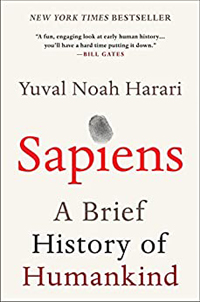Sapiens: A Brief History of Mankind
By Yuval Noah Harari
Reviewed by
Mark D. Walker
 The author takes us on a sweeping trek through the history of our species. His encyclopedic approach covers most of the great turning points of mankind, the agricultural revolution, scientific revolution and what unifies mankind.
The author takes us on a sweeping trek through the history of our species. His encyclopedic approach covers most of the great turning points of mankind, the agricultural revolution, scientific revolution and what unifies mankind.
The author’s all-encompassing perspective is summarized as, “One hundred thousand years ago, at least six human species inhabited the earth. Today there is just one. Us. Homo sapiens. This opens some very interesting questions, which the author deals with, like how did our species succeed and become dominant. Why did our foraging ancestors come together to create cities and kingdoms? How did we come to believe in gods, nations and human rights; to trust money, books and laws? And to top that off, what will our world be like in the millennia to come?”
The author also deals with a number of issues that reflect on today’s most challenging issues facing Americans today, such as the growing inequality of wealth and racism.
“The American order also consecrated the hierarchy between rich and poor. Most Americans at that time had little problem with the inequality caused by wealthy parents passing their money and businesses on to their children. In their view, equality meant simply that the same laws applied to rich and poor. It had nothing to do with unemployment benefits, integrated education or health insurance….The American order thereby upheld the hierarchy of wealth, representing the immutable laws of nature. Nature, it was claimed, rewarded merit with wealth while penalizing indolence.”
He goes on to say, “All the above-mentioned distinctions—between free persons and slaves, between whites and blacks, between rich and poor—are rooted in fictions.…Yet it is an iron rule of history that every imagined hierarchy disavows its fictional origins and claims to be nature and inevitable…”
Another interesting insight was that “culture” is a network of “artificial instincts.” After the agricultural revolution, these artificial instincts enabled millions of strangers to cooperate.
“Myths and fictions accustomed people, nearly from the moment of birth, to think in certain ways, to behave in accordance with certain standards, to want certain things, and to observe certain rules…”
A “Timeline of History,” graphics, a bibliography and an index all help the reader follow this epic story. Not surprisingly, the author is influenced by the American physiologist, ecologist, geographer, biologist and anthropologist, Jared Diamond, whose best-known book, “Guns, Germs and Steel,” was awarded the Pulitzer Prize.
Yuval Harari has a PhD in history from the University of Oxford and is lecturing at the Hebrew University of Jerusalem, specializing in world history. His books have been translated into 50+ languages and 12 million copies sold worldwide. Sapiens has been translated into 26 languages and has become an international best seller in the UK, Spain, Slovenia, Taiwan and Israel. The book was written with wit and verve, and readers of every political or philosophical stripe should check it out.
Paperback: 464 pages
Publisher: Harper Perennial; Reprint edition (May 15, 2018)
Language: English
ISBN-10: 9780062316110
ISBN-13: 978-0062316110
ASIN: 0062316117
Product Dimensions: 6 x 1.1 x 9 inches
Shipping Weight: 2.2 pounds (View shipping rates and policies)
Average Customer Review: 4.6 out of 5 stars 5,029 customer reviews